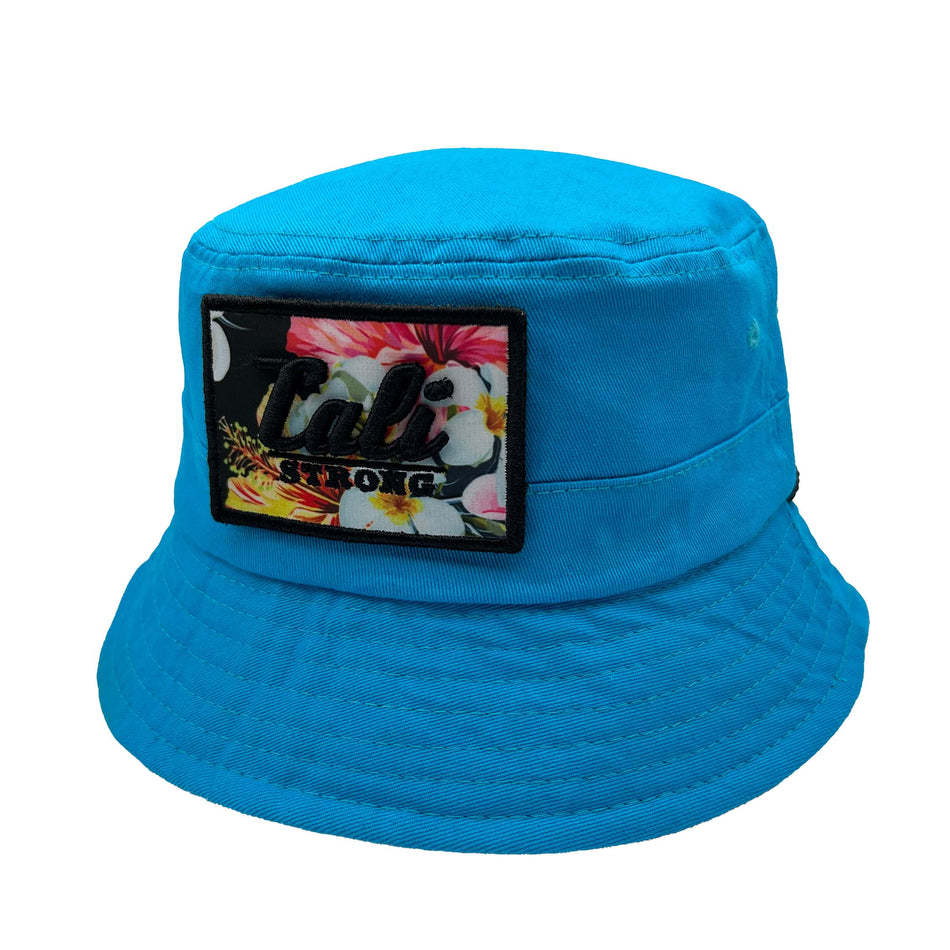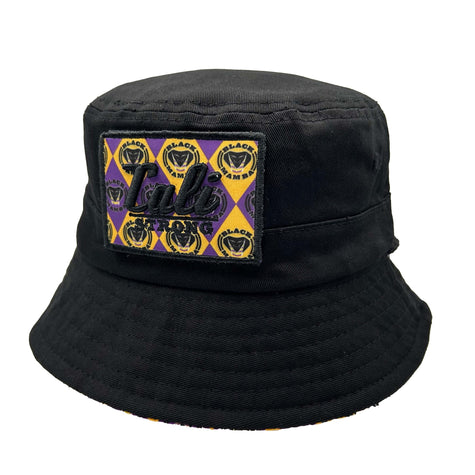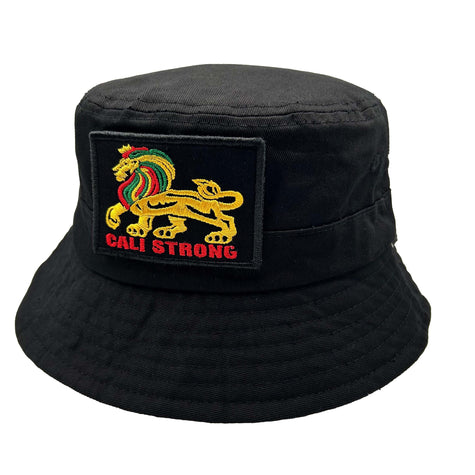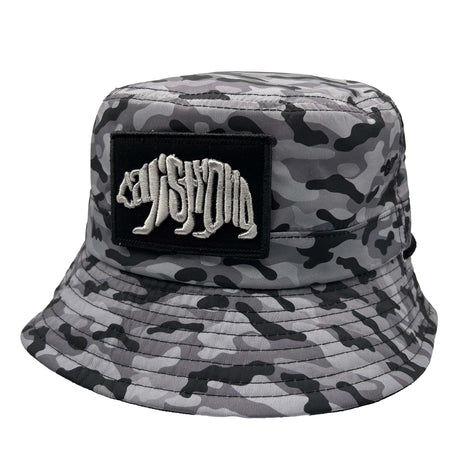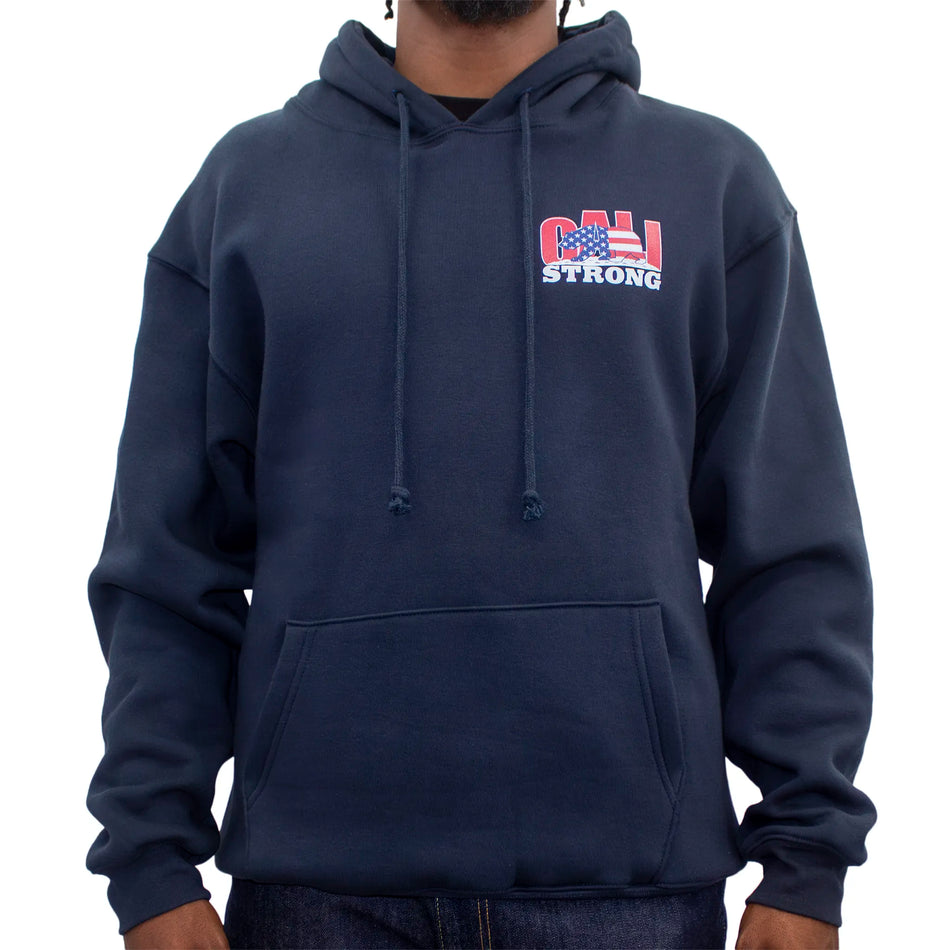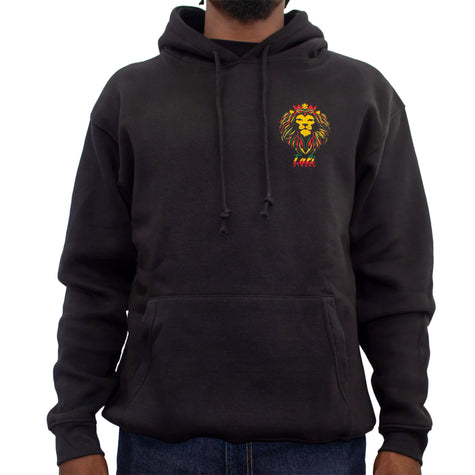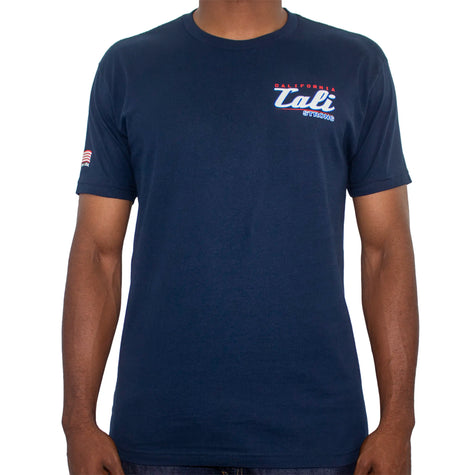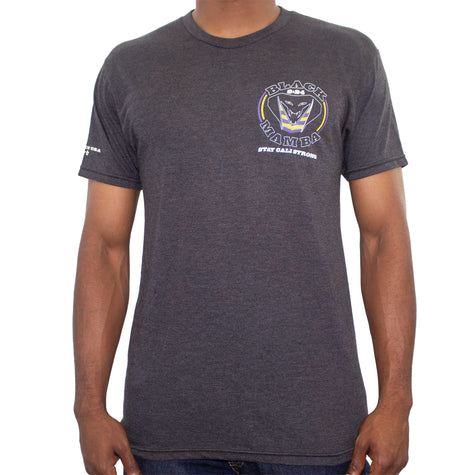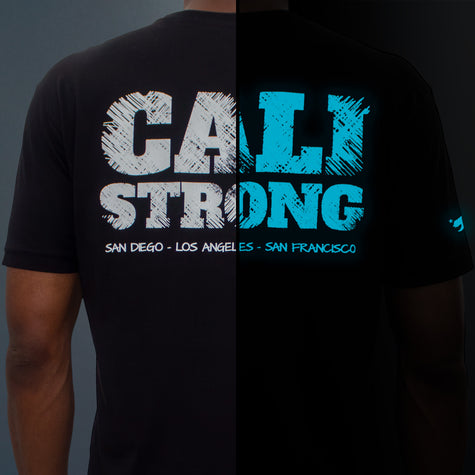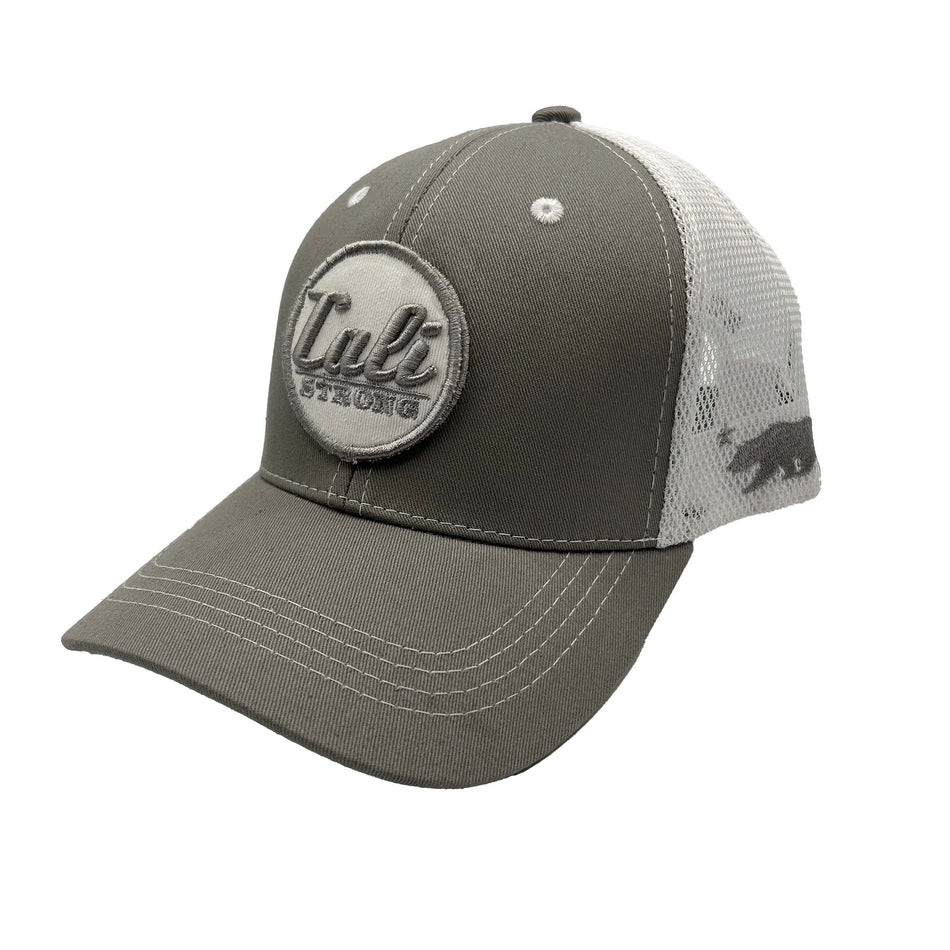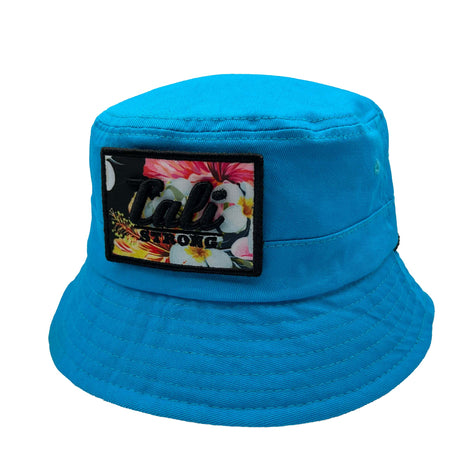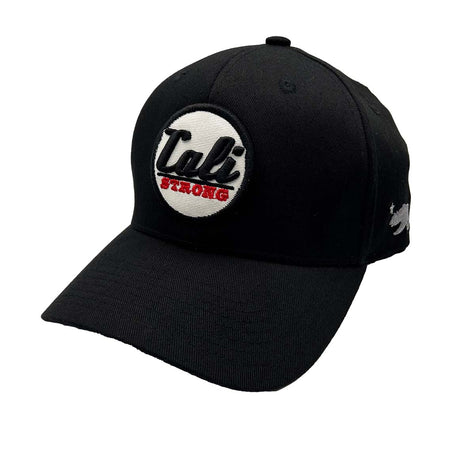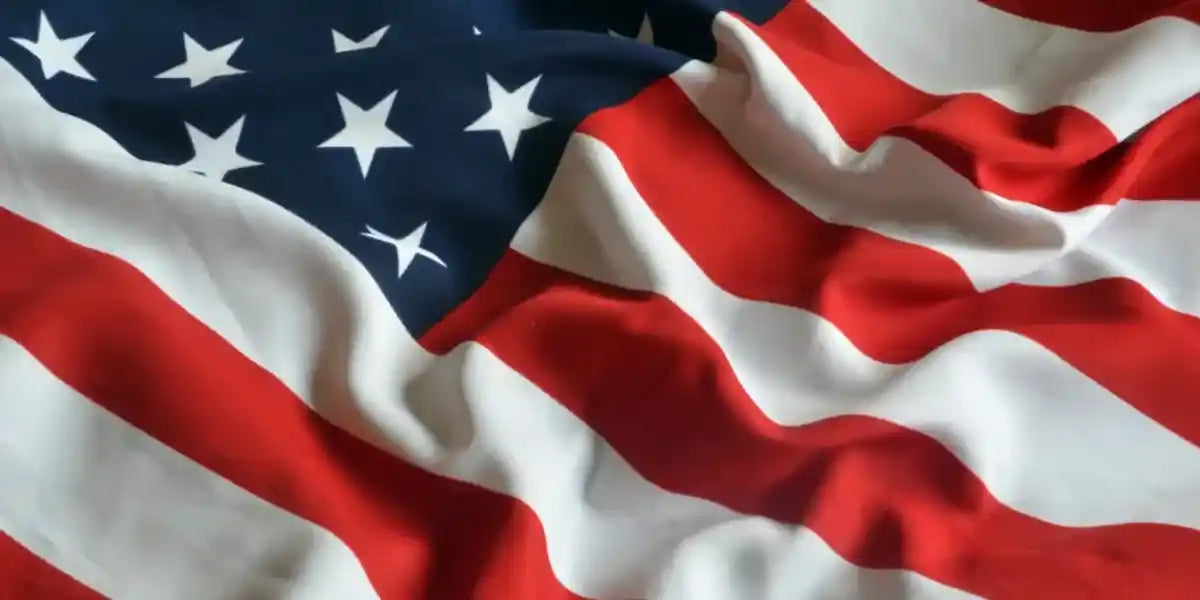The Ultimate Skateboard Buying Guide: Find Your Perfect Board
Whether you're just starting to push off on a board or shredding the streets for years, finding the right skateboard is key to elevating your ride. As someone who's spent decades in the skateboarding scene with Converse and Adio, I can tell you it's not just about the board; it's about finding a piece of yourself in that setup. Your skateboard should reflect your style, experience, and the kind of skating you're into, not to mention fitting your body type.
Over the years, I've seen all kinds of skaters. From the bright-eyed beginners to the seasoned pros, everyone's got their unique flair, and that's what makes this sport so incredible. Let me take you through some essentials to consider when picking out your skateboard.
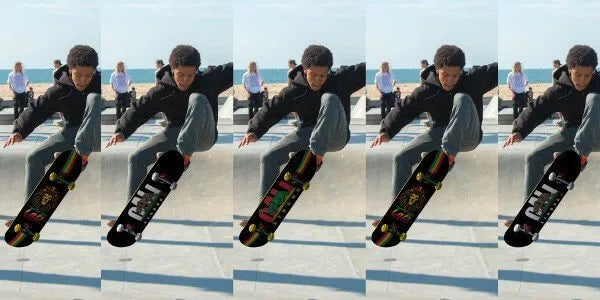
CALI Strong Skateboard Series
Choosing the Right Skateboard for Your Skill Level: Beginner to Expert
Some skateboards are made for experts, while others are designed for beginners. You need to discern your skateboarding skill level before deciding what kind of skateboard to buy.
- Beginner – If you're just starting, the focus is stability and ease of use. You're still getting the feel of the board, finding your balance, and making those first turns. A wider, more supportive deck is your best friend here.
- Intermediate – Now you've got the basics down, it's time to start experimenting. You're looking for a supportive board that gives you the freedom to try some tricks.
- Expert – You're pushing the limits, always looking for that next big trick. Your board needs to be tough, responsive, and ready to take some serious action.

The Word Ambigram Rasta Skateboard is the world's first ambigram rasta deck.
Identifying Your Skating Style: From Street to Longboard
The type of terrain you ride on determines your skating style. Though you may fit into more than one category, you should choose a board designed for your typical style and terrain.
- Vert – Vert skaters are riders who use vertical structures to get air and do tricks. This is usually done on ramps or in empty concrete pools. If you're all about catching air and dropping into bowls, you'll want a lightweight, maneuverable board.
- Technical/Street – Street and technical skateboarders usually ride outside on ramps, rails, curbs, benches, and streets, so they need boards that can hold up to the elements while still providing technical ease. They both need a maneuverable board that is tough enough to survive outdoors.
- Longboard – Longboard skaters use boards that are extra long. This design makes for a fluid and smooth ride that is perfect for travel or just cruising around.
- All Around – Most skateboarders are considered all-around skaters as they skate anywhere and everywhere. Doing all types of styles, all around skaters need sturdy and reliable boards.
Selecting a Skateboard That Fits: Matching Board to Body Type
Skateboard Deck Size Chart for Body Height & Shoe Size
It's not just about how cool the board looks; it's gotta fit you right. The width, length, and even the concavity of the deck play a huge role in how comfortable you feel on the board. I always advise skaters to come in and actually stand on a few boards – feel that connection with the deck. There are just some things you can't do in a web browser.

Skateboard Deck Size Chart
Skateboard Deck Size Calculator
Result
I'd like to highlight an important aspect of skateboarding – the diversity in styles, brands, and types of boards, which inherently brings a variety of price points. For those seeking a straightforward option, pre-assembled skateboards are priced from $75 to $245, offering a range of choices for different needs and budgets. On the other hand, there are custom board assemblies for enthusiasts desiring a more personalized experience. The cost for these is variable, depending on the individual components you select.
Skateboard Technology Explained: Components That Matter
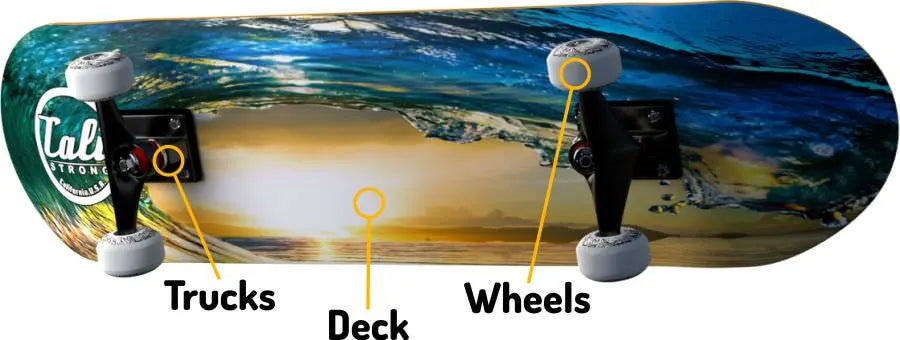
Skateboard Parts: Trucks, Decks, & Wheels

Skateboard Truck Part Diagram
Parts of a Skateboard
- Deck
- Wheels

Skateboard Wheels
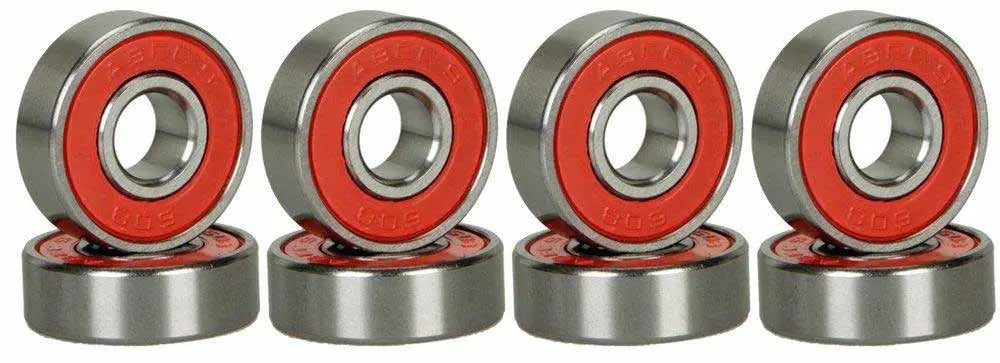
Skateboard Bearings

CALI Strong Original UCLA Skateboard
Decoding Skateboard Decks: Types and Features
Decks primarily fall into two broad categories in skateboarding, each catering to distinct styles and preferences. Firstly, we have the Trick or Street decks, characterized by their length of under 33 inches. These decks are the quintessential choice for street skating and technical maneuvers, owing to their compact size and agility.
Secondly, there's the Longboard category, encompassing boards that exceed 35 inches in length. Longboards are favored for cruising, offering a smooth, flowing experience reminiscent of surfing. This makes them ideal for longer rides and a more relaxed skating style.
With their versatility and commonality, traditional street decks are popular among many skaters. Meanwhile, longboards cater to those seeking a different kind of ride, emphasizing comfort and a leisurely pace. Each type presents unique advantages; the right choice ultimately depends on the skater's style and desired skateboarding experience.
Understanding Skateboard Deck Curvature: The Key to Control
The deck design plays a pivotal role in the board's performance. Most trick decks, except some longboards, feature a distinct raised nose, tail, and sides. This curvature across the width of the deck is known as the concave. It's not just a design element; the concave profoundly influences how the skateboard responds to the skater's movements.
The depth and shape of the concave are critical. A deeper concave allows for more aggressive maneuvers, giving experienced skaters the leverage and control needed for complex tricks. On the other hand, a shallower or more mellow concave provides a more forgiving platform, which is particularly beneficial for beginners. This design aspect ensures that skaters can choose a deck that aligns with their skill level and skating style.

Skateboard Concave Diagram

Concave Deck Full Example
Choosing the Right Deck Width for Your Skating Style
The width of the skateboard deck is a crucial factor to consider. Typically, the standard width ranges from 7.5 inches to 8.25 inches. This measurement is influenced significantly by the rider's physical stature as well as their preferred style of skating. For instance, larger riders or those who predominantly skate on ramps and in vert skating tend to opt for wider decks. This preference is due to the increased stability and surface area of wider decks. Conversely, street skaters often lean towards narrower decks, finding them more maneuverable and better suited for technical tricks and urban skating.
| Skateboard Deck Width | Recommendation |
|---|---|
| 7.5" to 8" | Standard for skateboarders taller than 5'3" with a shoe size of 9 or up skating streets or doing more technical tricks |
| 8.0" to 8.25" | Skating pools, ramps and parks |
| 8.25" and larger | Vert, pools, cruising and just going old school |
| 5'3" to 5'8" | 31.5" to 32" long |
| 5'8" to 6'1" | 32" to 32.5" long |
| Over 6'1" | 32.4" and up |

How to measure skateboard dimensions
When selecting your skateboard deck, it's essential to focus on the width rather than the length. While the average skateboard length spans between 28 inches and 32 inches, length is generally a secondary consideration, often emphasized more by advanced skaters. The width of the deck, however, plays a more pivotal role in aligning with your skating style and ensuring a comfortable and effective skateboarding experience.
| Skater Height | Skateboard Deck Length |
|---|---|
| Under 4' | 29" or smaller |
| 4' to 4'10" | 29" to 30" long |
| 4'10" to 5'3" | 30.5" to 31.5" long |
| 5'3" to 5'8" | 31.5" to 32" long |
| 5'8" to 6'1" | 32" to 32.5" long |
| Over 6'1" | 32.4" and up |
The Importance of Wheelbase in Skateboard Deck Design
The wheelbase plays an important part in determining the board's handling characteristics, stability, and maneuverability. This choice is what makes you a skateboarder or a longboarder. A shorter wheelbase leads to a more responsive board. It's nimbler, making it a great choice for executing technical tricks and navigating tight turns – ideal for street skating and complex maneuvers.

Skateboard Parts Diagram
On the other hand, a longer wheelbase provides a different kind of advantage. It offers enhanced stability, which becomes increasingly valuable at higher speeds or for skaters with a larger build. A longer wheelbase was always the go-to for those downhill rides, where control at speed was crucial.

AMERICA HOW BIG'S YOUR BRAVE SKATEBOARD
Selecting Skateboard Deck Materials for Durability and Performance
Ply refers to the individual layers of wood compressed together to form the skateboard deck. As someone who's seen countless boards over the years, I can tell you that the number of layers is directly tied to the deck's durability and performance. Generally, the higher the ply count, the sturdier and more rigid the board becomes, though this does add to the weight. Most street skateboards you'll find are seven-ply, and it's rare to see decks exceed nine-ply.
Maple wood is the gold standard in skateboard manufacturing. Canadian maple, in particular, stands out for its exceptional strength and lasting durability. From experience, I can tell you their resilience is unmatched.
7-Ply Maple
This is your classic skateboard deck construction – seven layers of Canadian maple, each bound by glue. Some decks in our collection are crafted with resin epoxy glue, which is a notch stronger, giving the decks an extra bit of stiffness.
8-Ply Maple
Stepping up in strength, the 8-ply decks consist of eight thinner layers of wood. This composition results in a more robust deck capable of withstanding greater impacts. It's a great middle ground for those who need something tougher than a standard 7-ply but without too much added weight.
P2 Decks
P2 decks are where it's at for the skaters looking for cutting-edge technology. These feature an innovative construction with an oval-shaped Kevlar Fiber reinforced maple veneer, complemented by six thinner plies. The result is a deck that's not only stronger and more resilient but also has a spring-loaded pop that really enhances performance. These decks are lighter and thinner than most, making them a popular choice among skaters who are serious about their gear. Thanks to their unique build, I've seen some skaters pull off incredible tricks with P2 decks.
Technology Decks
We carry two technology decks here: Double Impact and Impact Support Constructions. These boards are made up of different kevlar/maple & carbon constructions and make a lighter, stronger deck. Some of these even come with a breakage warranty, so if you break decks regularly, it may be worthwhile to check these boards out.
Wheels and Bearings: The Core of Skateboard Performance
The right wheels and bearings are crucial in skateboarding. Wheels determine your connection to the ground, affecting speed and feel. Bearings, though small, are vital for wheel rotation and overall smoothness. Understanding these components is key to enhancing your skateboarding experience.
Skateboard Wheels: Choosing Size and Hardness
Skateboard Wheel Size
Let's dive into the world of skateboard wheels. Every skater knows that these wheels are all crafted from polyurethane. A whole spectrum of compositions and colors is out there, each offering a different ride. Wheel size (Diameter), measured in millimeters, plays a massive role in how your skateboard performs, especially regarding speed.
The larger the wheel, the faster you'll roll, especially going downhill. This is why you'll find bigger wheels, those above 60 mm, on longboards. They're not just larger; they're typically wider, too, which adds a lot of stability to your ride – a real boon when cruising at higher speeds.
| Skateboard Wheel Size | Best Use |
|---|---|
| 52-55MM | Good for many uses. Street, skate parks, bowls. Smaller riders. |
| 56-60MM | Good for many uses. Street, skate parks, bowls, vert ramps. Bigger riders. |
| 60+ MM | Specialty rides. Longboards, hill riding, dirt boards. |
The wheel size usually falls between 52 mm and 60 mm for regular skateboards. This size range is a sweet spot for many skaters, providing a balanced blend of speed, control, and agility. Whether navigating street obstacles or pulling off tricks at the park, these wheel sizes offer the versatility most skaters need.
Choosing the right wheel size isn't just a technical decision; it's about matching your skating style and where you ride. What works for you may not fit someone else.
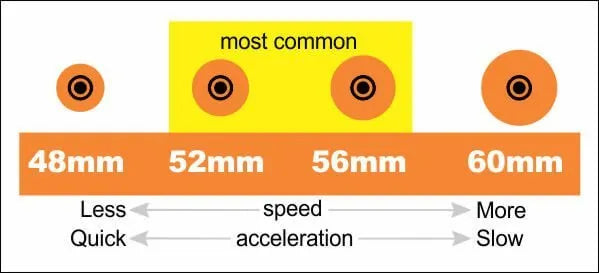
Skateboard Wheel Size Diagram
Skateboard Wheel Hardness
All street skateboard wheels are considerably hard. Hardness is rated in a measurement called Durometer. Any wheel over 90a is considered hard. The harder the wheels are, the more air a skateboarder can pop, but they land hard with greater shock to the legs.
Large wheels are also usually soft with less than a 90a durometer. The softness of these wheels creates a much smoother ride and offers more traction than harder, smaller wheels. Large and soft wheels are what give a longboard its surf feel.
| Skateboard Wheel Hardness Durometer | Best Use for Each Wheel Hardness |
|---|---|
| 87A | Cruiser riding, longboards, hill riding. Very rough surfaces. |
| 95A | Street riding, rough surfaces, smooth, fast, and durable. |
| 97A | All around street, skate park, ramp and pool. Good on smooth surfaces. |
| 100A | Very hard with the least grip. Not good on rough or slick surfaces. Used by pros. |
A good starting point to learn which wheel fits you best is a diameter range of 52 mm to 54 mm, with a durometer hardness of 98a.
Skateboard Bearings: Ensuring Speed and Smoothness
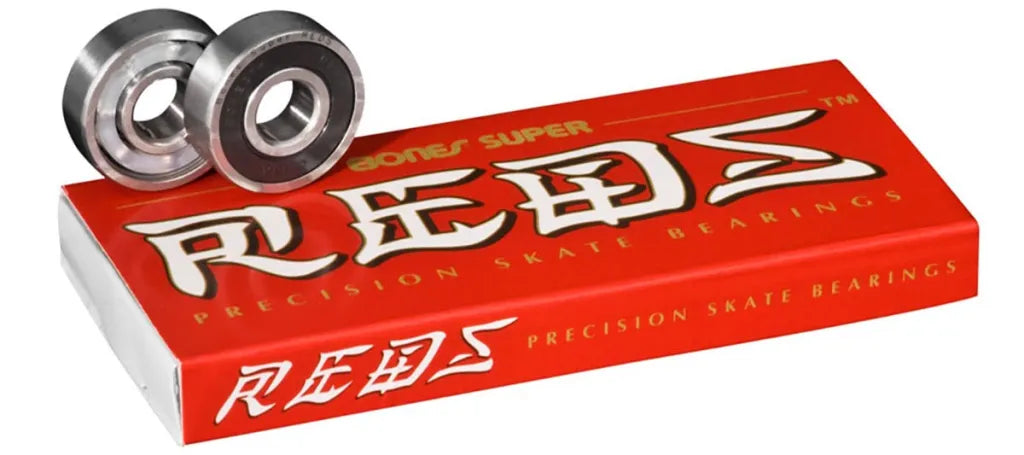
The preferred China REDS ABEC7
Skateboard bearings are found inside small metal rings that fit within the skateboard wheels. Skateboard bearings are rated using the Annular Bearing Engineering Committee (ABEC) odd number scale from 1 to 9. The scale rates bearings for their precision, with 9 being the highest. The more precise a bearing is constructed, the more delicate and vulnerable it is to damage.
ABEC 5 bearings are the norm in skateboarding because you get fair speed at an average cost. The coveted ABEC 7 skateboard bearings are very fast and smooth and tend to be slightly more expensive.
It is good to remember that the ABEC scale measures bearing precision only. It does not take into account a lot of factors important to skateboarding, like sheer. A bearing can have a good ABEC rating and sucks for skateboarding. Pay attention to brand names and reputation when buying.
Good brand names to look out for are Bones China REDS, Lucky, and FKD Bearings.
Grip Tape and Trucks: Essential Components for Control and Maneuverability
The secret to a skateboard's agility and precision lies in its grip tape and trucks. Grip tape offers the crucial grip for your feet, while trucks are central to steering and stability. This section delves into how these essential parts enhance your skateboarding experience.
Grip Tape: Ensuring a Firm Footing
The grip that you want is based entirely on your personal preference and skating style. Grit or AB ratings range from 12 grit to approximately 1000 grit. Grip tape for skateboarding ranges from only 24 grit to about 80 grit. The lower the grit, the more coarse and sharp the tape and the better your “grip.” Generally speaking, 24-40 grit is for fast freeride and downhill, whereas 50AB-80AB is for slow freeride, technical freeride, freestyle, cruising, etc.

CALI Strong Full Color Skateboard Grip Tape Is Durable & Grippy
A low grit for freestyle would destroy your shoes and slice up your hands from repeated use. This is why freestyle-oriented or everyday boards use 80-grit grip tape.
| Grit/AB | Particle Size MicroMeters | Brands |
|---|---|---|
| 24 | 708 | Gator Super Coarse XC, Diablo Extra Course |
| 30 | 632 | Old Black Vicious |
| 36 | 530 | New Black Vicious, New Clear Vicious, Gator Grip Coarse, Thumb Cutter |
| 40 | 425 | Red Vicious, Blood Orange, Diablo Course Belt Sander |
| 50 | 348 | Loaded Course (Chubby Unicorn) |
| 60 | 265 | Gator Standard (Colored), Bustin |
| 80 | 190 | Jessup, CALI Strong, MOB, Most Street Board Grip, Iron Horse |
Skateboard Trucks: The Pivot of Skateboarding Dynamics
The axles holding your wheels to the board are called “trucks.” Some trucks have special features that add to their cost. Features like a lighter weight or longer lifespan you will pay extra for.
In picking the right size truck for your deck, you want it to be about the same width as your deck. For a street board, 139 millimeter-wide trucks are the most common. Tighten the kingpin bolt on the trucks for flip tricks and loosen it for carving.
Your life can depend on your trucks, so stick with quality brand names like Thunder, Independent, and Venture.

Skateboard Truck Parts Diagram
Making the Right Choice: Final Steps for Your Skateboard Purchase
Choosing the right skateboard is an important decision when you're starting your skateboarding journey. It's all about finding the right combination of style, functionality, and suitability to your skill level and physical attributes. Take the time to consider your options carefully, and you'll be well on your way to enjoying the ride of your life with a skateboard that's perfect for you. Remember to skate safely and have fun!
Frequently Asked Questions about Skateboarding
Question 1: What is the best skateboard for beginners?
Answer 1: Beginners should opt for a sturdy, stable skateboard that matches their body size. A wider deck with softer wheels is usually recommended for starters to aid in balance and control.
Question 2: How do I determine my skateboarding style?
Answer 2: Your skateboarding style is often influenced by the terrain you ride on. You're likely into vert skating if you prefer ramps and vertical structures. If you enjoy street skating with tricks on urban obstacles, then technical/street is your style. Longboarding is for those who prefer cruising or traveling longer distances.
Question 3: What skateboard deck size should I choose?
Answer 3: Deck size depends on your height, shoe size, and personal preference. Generally, taller riders with larger shoe sizes prefer wider decks for stability. A deck size chart can help you determine the appropriate size.
Question 4: How often should I maintain my skateboard?
Answer 4: Regular maintenance is crucial for optimal performance. This includes cleaning and lubricating bearings, checking for wear in wheels and decks, and ensuring that trucks are correctly adjusted.
Question 5: What’s the difference between skateboard wheel size and hardness?
Answer 5: Wheel size, measured in millimeters, affects the speed and smoothness of the ride. Larger wheels are faster and smoother, ideal for cruising and longboarding. Hardness, measured in durometer, affects grip and slide. Softer wheels offer more grip and are better for rough surfaces, while harder wheels are faster and suitable for smooth surfaces.
Question 6: How do I choose the right trucks for my skateboard?
Answer 6: The width of your trucks should match the width of your skateboard deck. Wider trucks offer stability for ramps and vert skating, while narrower trucks are better for technical street skating.
Question 7: Are there different types of skateboards for different skill levels?
Answer 7: Yes, skateboards vary based on skill levels. Beginners should look for supportive and stable boards, intermediates need boards that are versatile for tricks, and experts require boards that can withstand advanced maneuvers and tricks.
Question 8: Can skateboarding be used as a means of transportation?
Answer 8: Absolutely! Skateboarding can be an efficient and fun way to travel short distances. Longboards, in particular, are well-suited for commuting and cruising.
Question 9: What should I look for in skateboard bearings?
Answer 9: Bearings are rated by the ABEC scale, which measures precision. ABEC 5 bearings are a standard choice for a balance of speed and durability. Higher ABEC ratings offer more precision but may require more maintenance.
Question 10: How important is grip tape, and what type should I choose?
Answer 10: Grip tape is crucial for keeping your feet firmly on the board. The grit of grip tape varies, with coarser grit providing more grip. The choice of grip tape depends on your skating style and personal preference.
About the Author: Jim Stroesser, “The Brand Master”
With nearly four decades of experience, Jim Stroesser is a driving force in the world of global consumer branding across the sports, fashion, and entertainment industries. His journey from tech rep to CEO of iconic brands showcases his unparalleled ability to transform and elevate businesses.
As Co-Founder and CEO of CALI Strong, a direct-to-consumer sports brand based in San Diego, CA, Jim leads the charge in creating premium sports apparel, footwear, and equipment that embody the California lifestyle.
His legacy as an industry turnaround expert was cemented at Converse, where he spearheaded the brand's resurgence from bankruptcy, elevating its sales from $120 million to $285 million and finally a $305 million acquisition by Nike – a landmark deal that reshaped the industry.
Jim's expertise extends to leadership roles at Nike, Quiksilver, Oakley, LA Gear, Roxy, RL, Pony, Bob Marley and Adio. He currently serves on several boards, including SDSI, where he mentors emerging companies alongside Chairman Bill Walton.

The CALI Strong Wave State Longboard Drop Thru Complete


